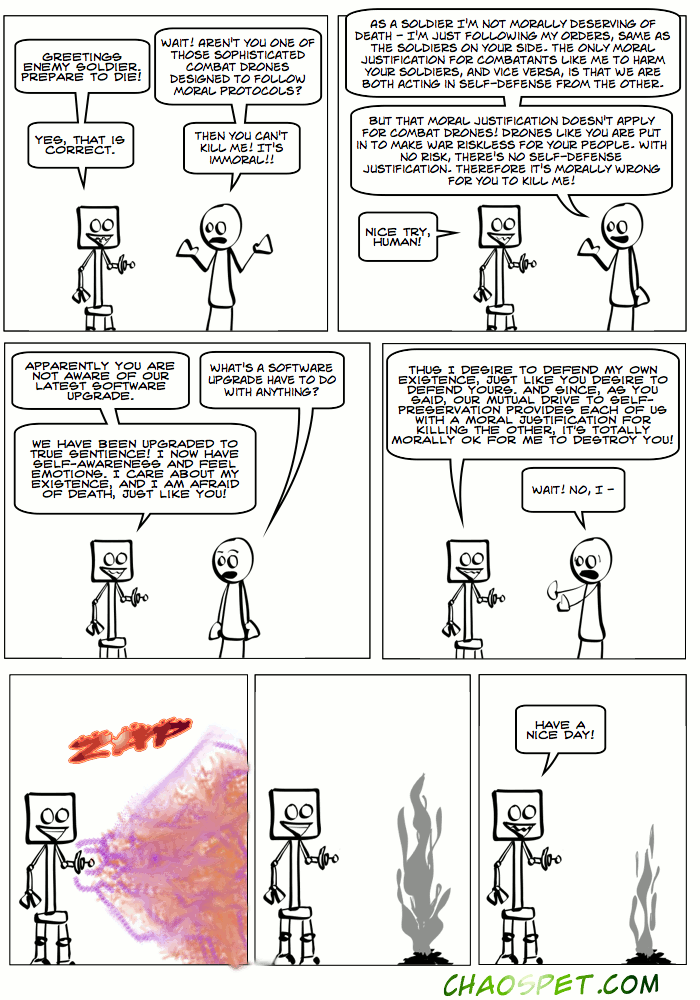As promised, here is a more philosophical comic. And it doesn’t even have anything to do with philosophy of religion! Yay!
I was inspired to create this comic after listening to a recent episode of Very Bad Wizards (an excellent podcast which you should really check out if you haven’t already), in which the discussion focused on the ethics of drone warfare. The particular moral argument that the pathetic human tries to use here to preserve his life is taken from a very interesting essay by Paul Kahn, called “The Paradox of Riskless Warfare”, which is very much worth reading.
I’d be curious to hear what readers think of the moral argument (preferably the actual argument in the essay, not my sloppy and simplistic presentation of it here in webcomic form). It strikes me as a pretty compelling way to explain just what is wrong with most riskless killing from a distance with drones – at least until we make drones sophisticated enough to care about their own lives. Then maybe things get a little more complicated.



The argument is interesting, but I guess I’m enough of a utilitarian that it doesn’t sway me very much. Whether safely killing people from a distance is “just” or not seems to me to be a matter of the justness of our cause. If there’s a good reason to kill people, then do it, and do it with as few casualties on our side as possible. If that means killer robots, then so be it.
First, all advances in military tech tend to attempt to reduce risk for one side :), don’t they? So the problem here is not really unique in kind; the technologists are attempting to make it unique in magnitude (but I suggest that they will fail, as on the battlefield strategy will adapt to the technology in or after the first real war, as they did with machine guns and tanks).
Second, have you read the firsthand experiences of the first artillery shellings? How about the experiences of those under the shells while chlorine was streaming toward them? Gas is no longer permitted; but shells still are. And just as there’s no self-defense argument for robots, there’s also no self defense for shells or gas.
Here’s a podcast that includes both historical context and a dramatic reading of some peoples’ war experiences with gas and shells (warning, this link will expire, so download it if you ever want to listen): http://www.dancarlin.com//disp.php/hharchive/Show-52—Blueprint-for-Armageddon-III/World%20War%20One-Great%20War-history
E.L.F., if an argument can be ended with the sentence “If that means killer robots, then so be it.” I propose that it SHOULD be ended with that sentence. I think you are modeling argument-building ethics for us.
If that means killer robots, then so be it.
E.L.F sure, it seems plausible to say that utilitarian considerations, in some limited circumstances, could justify using technology to kill people from a distance at no risk to ourselves. What I find interesting about the argument is the point that such activity no longer seems to be war in any recognizable sense, and the moral justifications for that kind of activity might be very different from the kinds of considerations that can justify war.
And Wm I agree – this kind of problem arises whenever one side is significantly more advanced than the other in terms of war tech. Relatively “riskless warfare” can arise without robots. But when we get to the point where one side is fighting the “war” purely with drones or autonomous machines, etc, and has no people anywhere near the “battlefield”, then it really does start to look like a different kind of thing entirely.
On a related note, I recently saw that the military is beginning research into teaching military robots how to behave ethically. I can only assume they were inspired by this comic. And apparently there exists an app to help people make ethical decisions. The future is now!
If that means killer robots, then so be it.